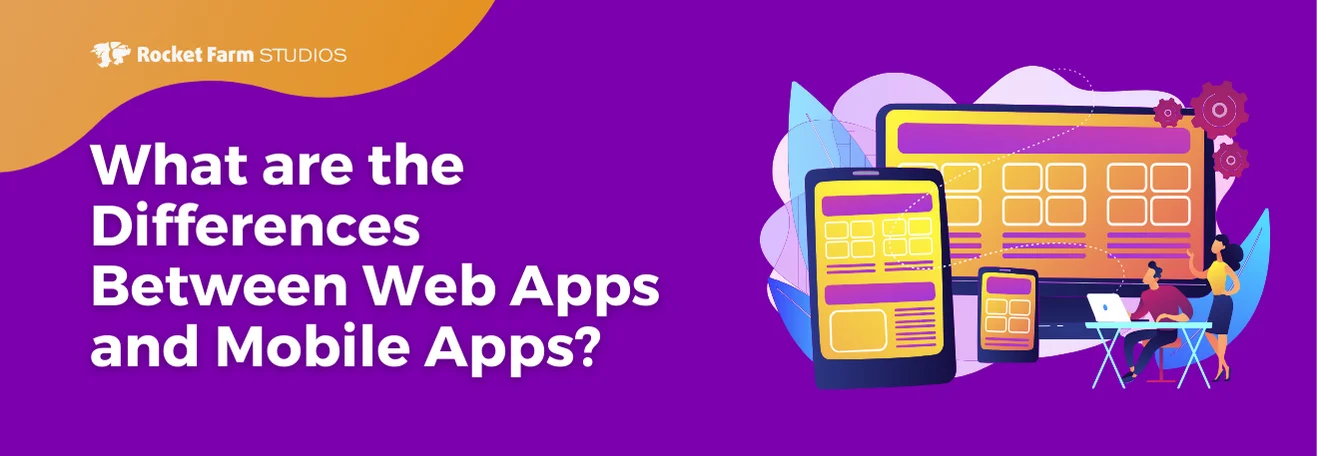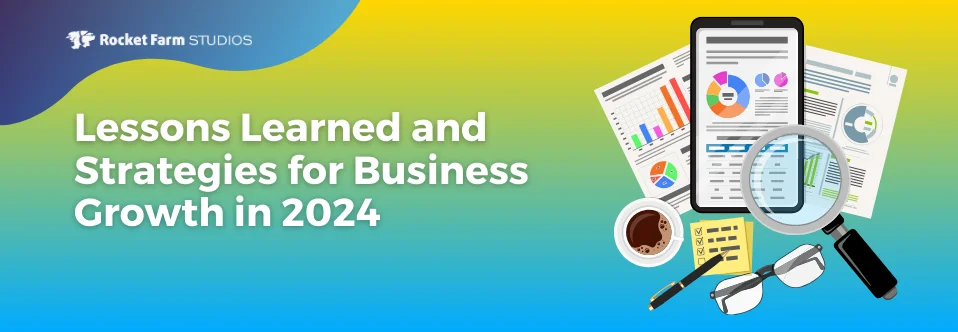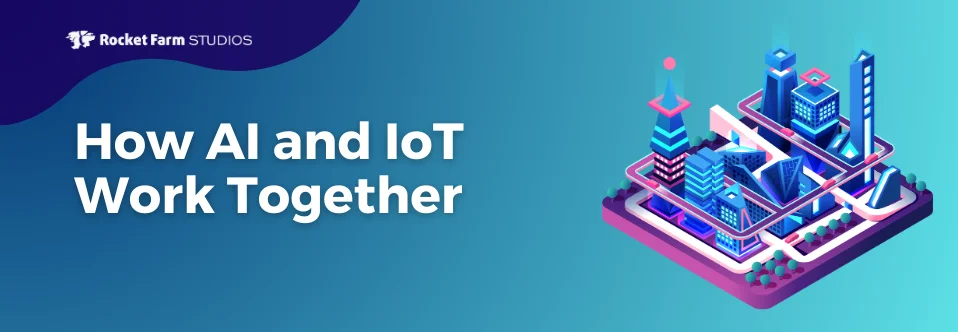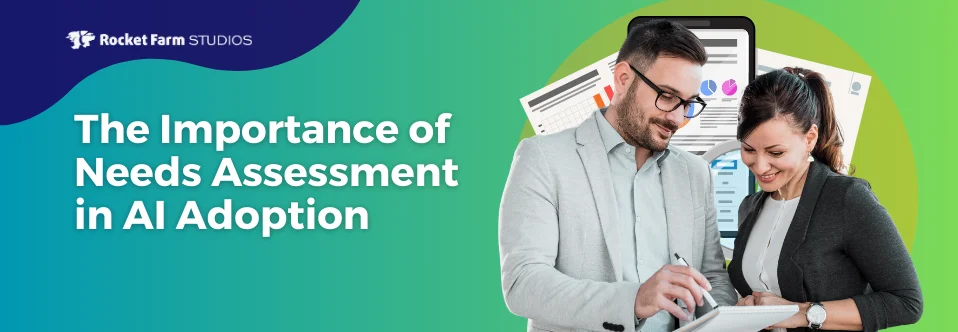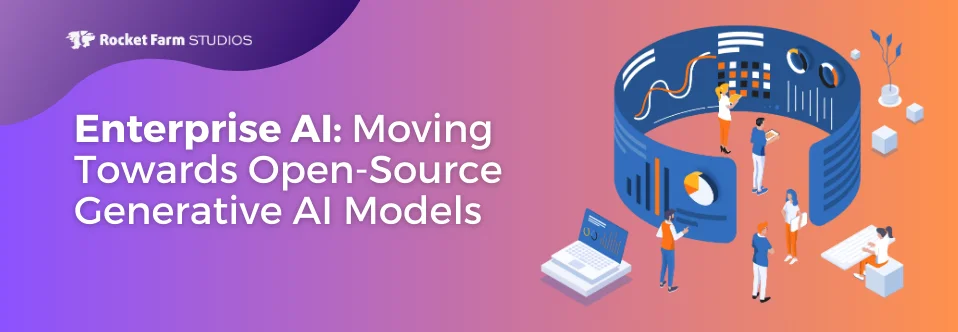
Generative AI is transforming enterprise operations, driving innovation and competitive advantage across diverse sectors. This rapidly evolving technology, capable of generating content from text to music, is transforming traditional business models and workflows. From accelerating drug discovery in healthcare to streamlining document drafting in legal domains, its applications are vast and varied.
As businesses adapt to this evolving landscape, they’re embracing diverse AI models and open-source platforms, highlighted by insights from Andreessen Horowitz, Gartner, and McKinsey. These shifts signify the need for enterprises to strategically integrate generative AI to unlock new efficiencies and value propositions.
With Rocket Farm Studios as your guide, let’s explore how businesses are rethinking their approach to generative AI, leveraging its potential to forge new paths in efficiency and creativity.
Shift Towards Multi-Model and Open Source Solutions
A significant transformation is underway regarding how enterprises select and utilize generative AI technologies. The traditional approach, heavily reliant on a singular or limited set of proprietary models—often dominated by major players like OpenAI (add more and tools as well) —is giving way to a more diverse and open ecosystem.
This shift is driven by the unique demands of businesses to customize AI solutions for specific use cases, each with its own set of performance, size, and cost requirements.
Embracing a Multi-Model Strategy
Enterprises are progressively experimenting with and deploying multiple generative AI models. This multi-model approach is not just about avoiding vendor lock-in; it’s a strategic move to harness the specific strengths of different models.
Whether it’s optimizing for computational efficiency, reducing costs, or tailoring AI outputs more closely to user needs, businesses are finding value in having a suite of models at their disposal.
This strategy allows them to pivot quickly in response to the fast-paced advancements in AI technologies, ensuring that they can always leverage the best tool for the task at hand.
It also allows them to experiment everytime there’s a new model in play, which allows them to leverage flexibility and gain the advantage on better versions of previous models.
The Rise of Open Source AI
Parallel to the trend of multi-model adoption is a notable surge in preference for open source AI models. Recent insights from Andreessen Horowitz indicate a growing inclination towards open source solutions among enterprises, marking a significant departure from the erstwhile dominance of closed-source models.
This move towards open source is motivated by several factors, key among them being the desire for greater control over data and the models themselves. Enterprises are increasingly wary of the security risks and limitations imposed by proprietary models, particularly concerning data privacy and operational flexibility.
Open source models offer a compelling alternative, providing the ability to customize and fine-tune AI technologies to fit specific business needs without the constraints of closed ecosystems. This freedom is particularly valuable for enterprises looking to innovate and develop unique applications of generative AI, from enhancing customer experiences to streamlining operational processes.
Factors Fueling the Shift
The transition towards a multi-model, open-source paradigm is fueled by a combination of practical and strategic considerations:
- Control and Customization: Enterprises seek to have sovereign control over their AI implementations. This includes the ability to modify models to suit unique business contexts and to ensure that AI outputs align closely with organizational objectives.
- Cost Efficiency: Open source models often present a more cost-effective solution compared to their proprietary counterparts. Without the licensing fees and usage restrictions associated with closed-source models, businesses can deploy AI more broadly across their operations.
- Security and Integration: Data security remains a paramount concern, with enterprises preferring solutions that can be safely integrated within their existing IT ecosystems. Open source models, especially those that can be hosted on-premises or in a private cloud, offer a level of security and privacy that is harder to guarantee with proprietary models.
- Rapid Prototyping and Innovation: Open-source tools enable faster prototyping and testing, allowing companies to innovate and iterate quickly without being hampered by proprietary software constraints or delayed updates.
- Community-Driven Enhancements: The collaborative nature of open-source projects means that enhancements and bug fixes often come from the community, leading to more robust and rapidly evolving tools. This community-driven model helps ensure that the software stays at the cutting edge of technology and meets the evolving needs of its users.
There are plenty of reasons businesses gravitate towards open-source generative AI. Open-source platforms aid in skill development and attract top talent, essential for companies wanting to stay at the cutting edge. They also ensure interoperability across different systems, vital in complex tech environments.
Moreover, the sustainability of open-source software allows businesses to maintain continuity without dependency on any single vendor.
Lastly, the collaborative nature of open-source projects harnesses global insights, enhancing the tools’ capabilities and effectiveness, making them an attractive option for forward-thinking enterprises.
Rapid Adoption and Integration Forecasts
The horizon of generative AI within enterprises is poised for a remarkable transformation by 2026, with projections indicating that over 80% of organizations are expected to have integrated generative AI technologies into their operations. This forecast marks a dramatic escalation from less than 5% in 2023.
This rapid adoption trajectory, highlighted by Gartner, reflects the urgency and enthusiasm with which industries are preparing to embrace generative AI capabilities.
Across-the-Board Integration
The adoption of generative AI is not confined to tech-centric sectors but is anticipated to have a profound impact across a diverse range of fields including healthcare, life sciences, legal, financial services, and the public sector. In healthcare, generative AI is revolutionizing patient care and treatment methodologies, while in the life sciences, it accelerates research and development activities.
The legal sector sees generative AI as a powerful tool for enhancing the efficiency and accuracy of document review and case preparation processes. Financial services leverage AI to improve decision-making and customer service, and the public sector looks to these technologies to enhance civic engagement and streamline services.
This cross-industry embracement is driven by the unique value generative AI offers in automating complex processes, generating novel solutions to longstanding problems, and providing insights derived from data analysis at unprecedented scales.
The breadth of its application speaks to generative AI’s versatility and its potential to serve as a pivotal tool in driving innovation and operational efficiency.
Implications for Innovation and Tool Development
The expected surge in generative AI adoption necessitates the development of new tools and applications tailored to the specific needs of different sectors. It also indicates a significant opportunity for technology providers to innovate and expand their offerings to meet the growing demand for generative AI solutions.
Enterprises are increasingly seeking platforms and APIs that can seamlessly integrate with their existing infrastructure, offering ease of use, scalability, and customizability.
Moreover, this forecast underscores the strategic importance of generative AI in maintaining competitive advantage and driving business growth. Organizations that proactively adopt and integrate generative AI technologies stand to benefit from enhanced operational efficiencies, improved customer experiences, and the ability to innovate rapidly in response to market demands.
Economic Potential and Industry Impacts
The staggering economic implications of generative AI, as highlighted by McKinsey & Company, suggest that its application across various industries could generate between $2.6 trillion and $4.4 trillion in value. This broad range underscores the technology’s versatility and transformative potential, marking it as a significant driver of future economic growth.
Such projections are part of McKinsey & Company’s comprehensive analysis on the economic potential of generative AI, delving into how it stands as the next frontier in productivity.
Transformative Effects in Software Engineering
One of the most immediate impacts of generative AI is observed in the realm of software engineering. Tools like GitHub Copilot, which leverage generative AI, have demonstrated the capability to boost productivity by up to 45% of current annual spending on software development functions.
This not only represents a substantial cost saving but also signifies a shift in the nature of software engineering work. With generative AI taking on more of the routine coding tasks, software engineers are increasingly focusing on design and architecture roles, where human creativity and insight add the most value.
This transition could fundamentally alter the skill sets required in the tech industry, emphasizing more strategic and creative capabilities.
Revolutionizing Research and Development
The research and development (R&D) sector, particularly in life sciences and chemical industries, stands to gain significantly from the adoption of generative AI. The technology’s ability to accelerate drug and material development processes promises to reduce R&D costs by 10 to 15%. This reduction is not just a matter of financial savings; it represents a paradigm shift in how new products and treatments are brought to market.
By enabling faster and more efficient exploration of potential solutions, generative AI could drastically shorten development timelines, bringing life-saving drugs and innovative materials to the public much quicker than has previously been possible.
These advancements in generative AI are indicative of a broader trend towards more agile and efficient R&D practices across industries.
The far-reaching implications of generative AI’s economic potential and its transformative impact on industries like software engineering and R&D highlight the importance of embracing this technology.
Final Thoughts
With the evolution of generative artificial intelligence (AI), three pivotal shifts are poised to redefine the corporate and economic landscapes.
Firstly, the move towards a diversified, open-source model adoption marks a significant departure from the reliance on single-vendor, proprietary AI solutions. This transition not only democratizes access to cutting-edge AI technologies but also empowers enterprises with the flexibility and autonomy needed to tailor AI functionalities to their unique requirements.
Secondly, the expected rapid integration of generative AI across enterprises underscores an imminent transformation in how businesses operate and innovate. With forecasts indicating that over 80% of enterprises will leverage generative AI by 2026, the urgency for organizations to adapt to and integrate these technologies into their operational frameworks has never been more critical.
And thirdly, the significant economic potential of generative AI, projected to generate between $2.6 trillion and $4.4 trillion across industries, signals a monumental shift in value creation and productivity enhancement. Specifically, sectors like software engineering and R&D stand to benefit immensely, with potential productivity gains and cost reductions that could redefine the pace and nature of innovation.
In light of these transformative trends, the imperative for enterprises to stay informed and adaptable in the rapidly evolving generative AI landscape cannot be overstated. Staying ahead means continuous learning, strategic agility, and the courage to experiment.
Whether it’s customizing open-source AI models, harnessing the economic potential of AI-driven innovations, or ensuring seamless integration within existing operational frameworks, Rocket Farm Studios is here to support your business as you make the shift to incorporating generative AI.





